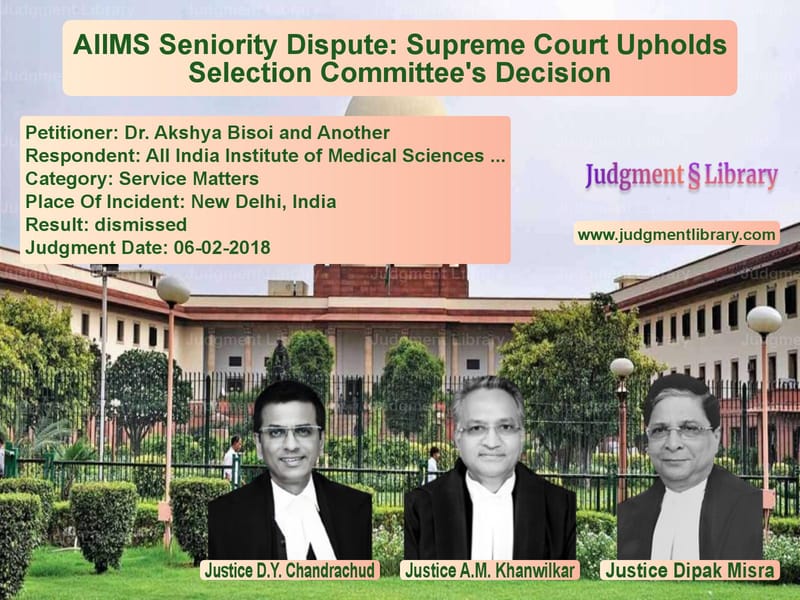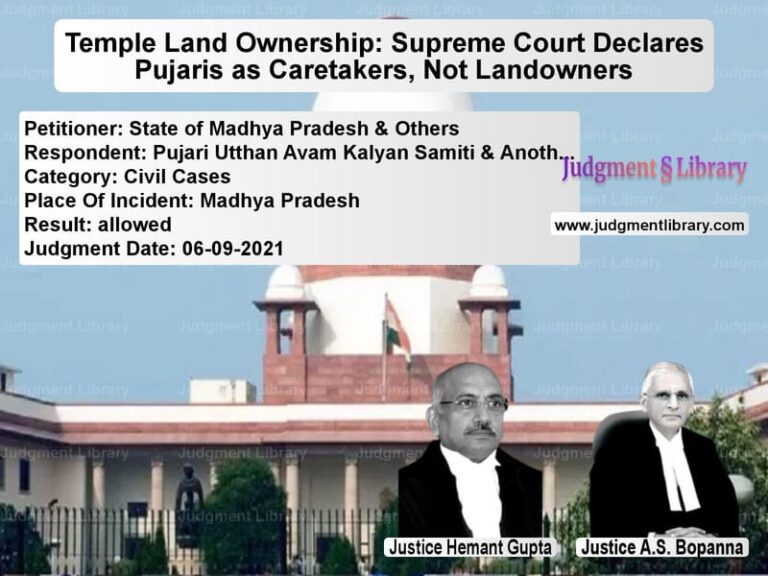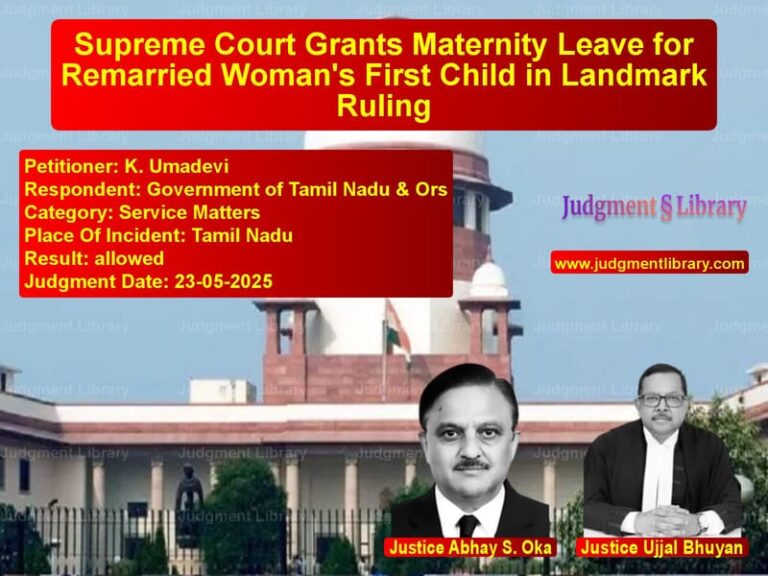AIIMS Seniority Dispute: Supreme Court Upholds Selection Committee’s Decision
The Supreme Court of India has ruled on a contentious dispute over seniority among three distinguished cardiac surgeons at the All India Institute of Medical Sciences (AIIMS). The case revolved around the selection process for Additional Professors in the Department of Cardio-Thoracic and Vascular Surgery (CTVS) and whether the petitioners, Dr. Akshya Bisoi and Dr. U.K. Chowdhury, should be ranked higher in seniority than their colleague, Dr. Shiv K. Choudhary.
The petitioners, who invoked the jurisdiction of the Supreme Court under Article 32 of the Constitution, sought a writ of mandamus directing AIIMS to determine their seniority in accordance with a binding policy decision from 1997. However, the Supreme Court dismissed their plea, ruling that the seniority list, as determined by the AIIMS Selection Committee, should not be disturbed more than a decade after the appointments were made.
Background of the Case
The petitioners, along with Dr. Choudhary, were appointed as Assistant Professors at AIIMS through direct recruitment on June 4, 2003. They were subsequently promoted to Associate Professors on July 1, 2003, and to Additional Professors on September 23, 2005. The selection of Additional Professors was conducted through open selection, and the candidates were ranked based on merit.
The Selection Committee ranked Dr. Choudhary as the top candidate, followed by Dr. Chowdhury and Dr. Bisoi. This ranking was consistently maintained throughout their promotions, with Dr. Choudhary eventually being the senior-most among them. The dispute arose when the petitioners challenged the validity of this ranking, contending that the grading system used by the Selection Committee was not properly followed.
Key Arguments from the Petitioners
The petitioners, represented by senior counsel, put forward the following arguments:
- The AIIMS Selection Committee should have determined their seniority strictly based on the grading system established in the 1997 policy.
- Dr. Bisoi received higher grades than Dr. Choudhary from at least one of the seven Selection Committee members, and this should have resulted in a change in the ranking order.
- The governing body of AIIMS had, at various points, acknowledged the merit in their claim, which should have led to a revision of the seniority list.
- The Union Ministry of Health and Family Welfare had directed AIIMS to reexamine the seniority list under Section 25 of the AIIMS Act, 1956.
Arguments from the Respondents
The respondents, including AIIMS and Dr. Choudhary, countered the petitioners’ claims with the following points:
- The seniority ranking was determined by a duly constituted Selection Committee and approved by the AIIMS governing body.
- The policy decision of 1997 did not mandate that seniority must be determined solely based on numerical grading but allowed the Selection Committee to make a holistic decision.
- The petitioners had failed to challenge their ranking within a reasonable period, as their claims came more than a decade after the selection process.
- AIIMS had revisited the issue multiple times and reaffirmed Dr. Choudhary’s seniority.
Supreme Court’s Judgment
The Supreme Court, while dismissing the petition, observed:
“The only dispute remaining to be decided is whether the Supervisors/Deputy Superintendents would be workmen or not. There are already two conflicting views of the Labor Courts. In the above circumstances, we do not find any justification for the High Court remitting the matter again to the Labor Court on the issue.”
The Court ruled that the matter had been reviewed multiple times, and any changes at this stage would cause unnecessary disruptions. The ruling emphasized that an administrative decision, once taken, should not be disturbed unless it is found to be arbitrary or illegal.
Key Takeaways from the Judgment
- The Supreme Court reaffirmed that Selection Committees have the discretion to determine merit rankings beyond mere numerical grading.
- The ruling establishes that long delays in challenging employment-related decisions weaken a petitioner’s claim.
- The judgment ensures that administrative decisions taken by expert panels in institutions like AIIMS remain stable and predictable.
Impact of the Judgment
The ruling has significant implications for employment disputes in government and academic institutions. It reinforces the principle that challenges to seniority rankings must be made promptly and that administrative discretion in selection processes should be respected unless there is clear evidence of arbitrariness or illegality.
Conclusion
The Supreme Court’s decision in Dr. Akshya Bisoi and Another vs. AIIMS & Others brings a decisive end to a prolonged dispute over seniority at one of India’s most prestigious medical institutions. By upholding the Selection Committee’s rankings, the Court has reinforced the need for stability in employment decisions and has set a precedent for future cases involving seniority disputes in public institutions.
Petitioner Name: Dr. Akshya Bisoi and AnotherRespondent Name: All India Institute of Medical Sciences & OthersJudgment By: Justice D.Y. Chandrachud, Justice A.M. Khanwilkar, Justice Dipak MisraJudgment Date: 06-02-2018
Don’t miss out on the full details! Download the complete judgment in PDF format below and gain valuable insights instantly!
Download Judgment: Dr. Akshya Bisoi and vs All India Institute Supreme Court of India Judgment Dated 06-02-2018.pdf
Direct Downlaod Judgment: Direct downlaod this Judgment
See all petitions in Employment Disputes
See all petitions in Promotion Cases
See all petitions in Public Sector Employees
See all petitions in Judgment by Dhananjaya Y Chandrachud
See all petitions in Judgment by A M Khanwilkar
See all petitions in Judgment by Dipak Misra
See all petitions in dismissed
See all petitions in supreme court of India judgments February 2018
See all petitions in 2018 judgments
See all posts in Service Matters Category
See all allowed petitions in Service Matters Category
See all Dismissed petitions in Service Matters Category
See all partially allowed petitions in Service Matters Category







